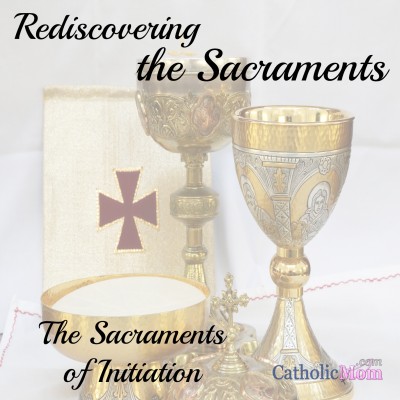It’s 5 a.m., and my alarm goes off. Time to begin a new day. A shower and cup of coffee get me going, before I wake up my children for school. After getting dressed and eating breakfast, we are off!
This is my morning routine five days per week. It’s quick, efficient and so automatic, we don’t need to think about what we have to do next.
On Sundays, my family and I have a different routine, as we get ready for Mass. Some enjoy sleeping in a bit, while I like to linger a little longer with my morning coffee. But there’s still a regularity with Sundays that turns our actions, including attending Mass, into routines, and again, we don’t have to think about what we’re doing.
This familiarity, this efficiency gets us to Mass on time (most Sundays). But one Sunday morning during Mass, it hit me. I had just received Our Lord in the Holy Eucharist, and I had done so without thinking.
Attending Mass weekly is something I have done all of my life. During some seasons, I have even been blessed with opportunities to attend daily Mass. And this is obviously a good thing! After all, we are called to frequent the sacraments often.
But on that Sunday morning, I humbly realized that sometimes I take the sacraments for granted, and they become habitual and a little too routine.
This caused me to pause and spend some time really thinking about what the sacraments are, what they mean to me, and how I can receive them with intention and wonder, rather than as routine.
For the next three days, we will explore the seven sacraments and how we can experience them in a deeper and more thoughtful way. Today, we will continue by defining the sacraments and looking more deeply at the sacraments of initiation.
What are the sacraments?
The Catechism teaches that “a sacrament is an outward sign instituted by Christ to give grace.” When God created us, He gave us senses in order to see, hear, taste, smell and touch. We use our senses for so many things; the list is endless.
One use of our senses is to experience God more intimately and tangibly. This can happen in everyday life as well as through the sacraments.
An example of using our senses to experience God in everyday life is through His beautiful creation. When my children and I are awake early enough to see the sunrise, and the sky is an amazing pink color, I tell them that the sunrise is God’s way of showing us how much He loves us in that moment, and we respond, “Thank you, Lord! We love You, too!”
In the sacraments, our senses also help us experience God’s love and presence in our lives. God gave us our tongues to taste the goodness of our Eucharistic Lord. He gave us our skin to feel the cleansing water of Baptism and the healing power of anointed oil. He gave us ears to hear His message of healing and forgiveness in Confession.
Not only do our bodies experience God through the sacraments, but so do our souls, because the sacraments give grace.
Grace is any gift of God, but especially God’s divine life in our souls. In other words, God wants us to share in His divine life so much, He gave us the sacraments as vehicles for His gift of grace. And God’s gifts keep on giving, because we can receive many of the sacraments more than once. And for the ones we only receive once, the grace we receive continues to grow and flourish in our hearts throughout our lives.
What do the sacraments mean to me?
Each of the seven sacraments is unique and significant. They touch all stages and important moments in a Christian’s life. The sacraments of initiation—Baptism, Confirmation and the Eucharist—lay the foundation of our lives. The sacraments of Reconciliation and the Anointing of the Sick heal us. And the sacraments of Holy Orders and Matrimony give us a mission to live out in our lives.
The Sacraments of Initiation
Baptism
I admit, for the longest time, I didn’t think much about my own Baptism, probably because I don’t remember it! But I am grateful to know my Baptismal day—April 4, 1976—because my godparents wrote the date on a tiny wine bottle from the celebration. For years, I kept that bottle on a shelf in my bedroom and often filled it with little flowers, and I still have that wine bottle today. Pope Francis recently encouraged us to find out our Baptismal day, because “to know the date of our Baptism is to know a blessed day. The danger of not knowing is that we can lose awareness of what the Lord has done in us, the memory of the gift we have received.”
And that gift of Baptism, which the Pope talks about, is the dignity of becoming beloved sons and daughters of God. The grace of being adopted into God’s divine life defines who we are and Who we belong to: we are God’s children, and we belong to Him!
If we ever lose sight of the importance of our own Baptism, we can easily be reminded. Like Pope Francis encouraged, find out the date of your Baptism as well as the Baptismal dates of your children. Mark them in your calendar and celebrate them every year. For those of us who are not parents, we can do the same for our godchildren, nieces, nephews or other special children in our lives. On those special Baptismal anniversaries, send a card in the mail or telephone that child to tell her how much God loves her and you are praying for her.
Confirmation
Confirmation is necessary for the completion of baptismal grace. In Confirmation, we receive a special strength of the Holy Spirit, which empowers us to go out and spread the Good News (CCC 1285).
Unlike Baptism, I remember my Confirmation! Most of us do. I was in ninth grade, and I recall having to learn the Catechism of the Catholic Faith. (There was even a test!) I chose Mary as my Confirmation name, because my grandmother’s name was Mary, and she had a true devotion to Our Blessed Mother. Both my grandma and Mama Mary continue to be strong intercessors and spiritual mothers in my life to this day. When I think back to the day I was confirmed in the Catholic Faith, I remember feeling the chrism oil on my forehead and hearing the words, “Be sealed with the gift of the Holy Spirit.”
The memories of Confirmation can renew our knowledge of the grace God poured upon us that day. We can use our memories to challenge ourselves in how we are living this grace, this strength of the Holy Spirit. We can ask ourselves: Can I be bolder in sharing my faith with others? Are there areas of my faith life that are lacking (like making Mass too routine) that I could ask the Holy Spirit for help?
Holy Eucharist
The Holy Eucharist completes Christian initiation and truly is the “source and summit” of our lives as Catholics.
When my oldest daughter, Anna, received her First Holy Communion, Father told us how the Missionaries of Charity have a sign in their sacristy for the priests who celebrate Mass for them. The sign reads, “Offer this Mass as if it is your first Mass, your last Mass, your only Mass.” He then told us how true that statement is for each and every one of us, as we approach the Altar of the Lord for Holy Communion. Every time we receive Holy Communion, we should receive Jesus as if it is our first Communion, our last Communion, our only Communion.
When Mass becomes too routine and automatic, this little teaching from my daughter’s First Holy Communion helps me to be mindful and intentional about what I’m doing at Mass. I am receiving Jesus, who offers Himself to the Father as a sacrifice for us, and then comes to us as the food and drink for our souls. For me, remembering to treat each Mass as my first, last and only Mass helps me open my heart and soul even more to the grace with which God wants to bless me, through the Holy Eucharist.
Questions to ponder: How do you keep the reception of the Holy Eucharist from getting too routine? Do you have a favorite prayer you like to say before or after Holy Communion? If not, perhaps the little lesson I learned at my daughter’s First Holy Communion can help you, too!
Tomorrow, we will explore the sacraments of healing: Reconciliation and Anointing of the Sick.
Copyright 2014 Sarah Damm
About the Author

Sarah Damm
Sarah Damm is a Catholic wife and mother of six children, living in Minnesota. She spends her days running errands, helping with homework, and keeping up with laundry and the family schedule. Sarah loves her faith, coffee, and good books. You can find out more about her at SarahDamm.com.



.png?width=1806&height=731&name=CatholicMom_hcfm_logo1_pos_871c_2728c%20(002).png)
Comments